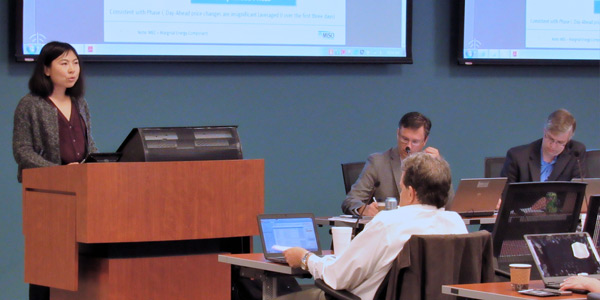CARMEL, Ind. — MISO last month called on load-modifying resources for the first time in 10 years after it declared an unusual mid-spring maximum generation emergency in the southern part of its footprint.
Unseasonably high loads coupled with a large number of generation and transmission outages precipitated the April 4 event in MISO South, RTO officials said in an emergency review.
The region lost almost 1,500 MW of generation just after midnight when a large unit unexpectedly went down. MISO issued a maximum generation alert around 8 a.m., and by 1 p.m., all resources were in use, with LMRs called up about two hours later. To compound conditions, temperatures topped 80 degrees Fahrenheit, exceeding April averages by about 8 degrees and driving unexpectedly high load.
“What we saw is temperatures that were more typical for May,” Rob Benbow, senior director of systemwide operations, said at a May 11 Market Subcommittee meeting.
Transmission outages were also higher than normal, with some lines down from earlier severe weather and seasonal maintenance, stranding generation in some cases. Spring maintenance season also sidelined a large number of generators.
All told, MISO called up about 730 MW of LMRs in MISO South to cover a projected 447-MW energy shortfall, marking the first time the RTO has relied on the resources since 2007.
“It’s the first time we’ve deployed load-modifying resources in quite some time,” Benbow said. “This isn’t unusual where you’ve got a lot of maintenance outages and high load in shoulder times.”
MISO forecasts a 79.3% probability that it will again call up LMRs this summer. (See MISO Slims Summer Reserve Prediction.)
Benbow said MISO’s new emergency pricing floors were initiated during the event and worked as intended. By about 9:30 p.m., emergency operations were lifted.
“I fully support overdoing it,” ITC’s Ray Kershaw said. “When you hit the button, you’re not sure how many peakers are going to show up. … You did your job, that’s for sure.”
MISO is still collecting meter data from the event and will evaluate the performance of the LMRs, Benbow said. Stakeholders asked whether operators of those resources are required to respond to run requests from MISO outside of summer peak conditions, an issue RTO staff said they would investigate.
Benbow credited successful management of the emergency event to MISO’s extensive drills. “You only get this through training,” he said.
MISO Officially Expands ELMP
MISO this month expanded its extended locational marginal pricing (ELMP) program to allow online units with one-hour start-up times to set prices.
The program — now entering its second phase — was previously available only to 10-minute fast-start resources.
The move means that 58% of MISO’s capacity is eligible to qualify as peaking resources, compared with 8% beforehand.
FERC accepted MISO’s filing to expand ELMP in an April 20 letter order (ER17-1081).
Twelve newly eligible resources participated in ELMP price-setting during the first day of implementation, said Concong Wang, MISO market design engineer.
MISO’s second phase of ELMP fell short of its Independent Market Monitor’s recommendation that price-setting be extended to all resources with a two-hour minimum run time. (See “MISO to Expand ELMP Price Setting, but not to IMM’s Specs,” MISO Market Subcommittee Briefs.)
Wang said MISO will present a post-implementation analysis at the December MSC meeting, after collection of about six months’ worth of data.
Additionally, the RTO is planning to discuss a potential new trading hub in Mississippi at the June 8 MSC meeting, Director of Forward Operations Planning Kevin Sherd said.
Proposal Would Address Cost Recovery Gap
MISO will revise its Tariff to address two possible gaps in cost recovery when units are manually redispatched offline.
The new language will allow generators to recover start-up costs and day-ahead margin assistance payments during required minimum down times following an RTO-ordered decommittment.
“We currently don’t allow for recovery of start-up costs when a resource is taken offline,” said MISO Market Quality Manager Jason Howard.
When MISO decommits a day-ahead resource, the day-ahead margin assurance payment does reimburse the resource for minimum down times or start-up costs. (See “Potential Cost Recovery Gap in Manual Redispatch,” MISO Market Subcommittee Briefs.)
MISO will file the language by the end of May and seek a next-day effective date, Howard said.
He also said he would have to follow up on a question by Customized Energy Solutions’ Ted Kuhn, who asked if MISO enforces any limits on a resource’s minimum downtime.
MISO, PJM in ‘General’ Agreement over Pseudo-Tie Congestion Remedy
MISO and PJM are in “general” agreement about using an interim rebate program to handle their overlapping pseudo-tie congestion charges, according to MISO Director of Forward Operations Planning Kevin Vannoy.
Vannoy said PJM is still reviewing a slight modification to the original agreement: that the RTOs exchange information about firm flow entitlements a day before a flow date to better predict the effect of congestion on pricing.
The RTOs proposed the rebate solution in early March as a stopgap. A longer-term solution will involve scheduling pseudo-ties in the day-ahead process. (See MISO, PJM Propose Solution to Pseudo-Tie Congestion Problem.) They have postponed their ambitious June 1 implementation date for the program to early September. Staff from both will review the solution again at the May 23 Joint and Common Market Initiative meeting held at MISO’s Carmel, Ind., headquarters.
— Amanda Durish Cook








